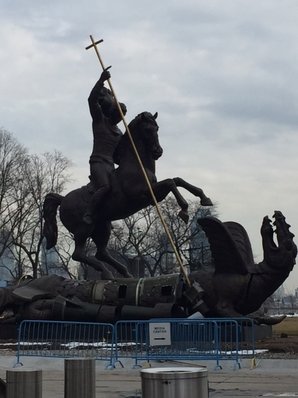SPIRITUALITY
901 — Louis M. Savary and Patricia H. Berne, Teilhard de Chardin On Love. Evolving Human Relationships. Paulist Press, 2017.
903 - Kathleen Duffy, Teilhard’s Mysticism. Seeing the Inner Face of Evolution. Orbis, 2014.
905 -William Johnston, The Mirror Mind. Spirituality and Transformation. Harper & Row, 1981.
907 — Dalai Lama, The Good Heart. A Buddhist Perspective on the Teachings of Jesus. Wisdom Pub. 1996, 1998.
930 — Anthony De Mello, Contact with God. Retreat Conferences. Loyola University Press, 1991.
931- Anselm Grun, Benedict of Nursia. His Message for Today. Linda M. Maloney, trans. Liturgical Press, 2006.
933 — James L. Connor, The Dynamism of Desire. Bernard J. F. Lonergan, SJ on the Spiritual Exercises of St. Ignatius of Loyola. The Institute of Jesuit Resources, St. Louis, 2006.
934—Harvey D. Egan, SJ, Soundings in the Christian Mystical Tradition. Liturgical Press, 2010.
935—Oscar Romero, The Violence of Love, compiles and trans. by James Brockman, Orbis, 1988.
936—Henri Nouwen, Love in a Fearful Land. A Guatemalan Story. Orbis, 2006.
THEOLOGY
917 - John O’Donohue, The Invisible Embrace Beauty. Harper, 2004.
918 - John D. Dadosky, The Eclipse and Recovery of Beauty. A Lonergan Approach. University of Toronto Press, 2014, 2017.
919 - Joseph Martos, Honest Rituals, Honest Sacraments: Letting Go of Doctrines and Celebrating What’s Real. Wipf and Stock Pub., 2017.
POPE FRANCIS
923 —Pope Francis, Rejoice and Be Glad. On the Call to Holiness in Today’s World. Orbis, 2018.
POLITICS/UNITED NATIONS
875 - E. Collier and C. Strain, Global Migration. What’s happening, why, and a just response. Anselm Academic, 2017.
877-Ashley, Burke, Cardenal (eds.), A Grammar of Justice. The Legacy of Ignacio Ellacuria. Orbis, 2014.
878 - Ahern, Clark, Heyer, Johnston (eds.) Public Theology and the Global Common Good. Orbis, 2016.
896 — Alan Ryan, On Machiavelli. The Search for Glory. Liveright Pub., W.W.Norton & Co., 2012, 2014.
897 - Peter Heather, The Fall of the Roman Empire. A New History of Rome and the Barbarians. Oxford, 2006.
899 – Marcus Aurelius, Meditations. Penguin Classics, 2006.
908 — Tom Fletcher, The Naked Diplomat. Understanding Power and Politics in the Digital Age. Originally published as Naked Diplomacy in 2016; William Collins, 2017.
913 — James Comey, A Higher Loyalty. Truth, Lies, and Leadership. Flatiron, 2018.
914 — Linda Fasulo, An Insider’s Guide to the UN. 3rd Edition, Yale Univ., 2003, 2009, 2015.
915—Michael V. Hayden, The Assault on Intelligence, Penguin Press. 2018.
916 - Dan Egan, The Death and Life of the Great Lakes. W.W. Norton & Co. 2017.
921- Nancy MacLean, Democracy in Chains. The Deep History of the Radical Right’s Stealth Plan for America. Penguin Books, 2017.
922 — Jeffrey D. Sachs, Building the New American Economy. Smart, Fair, & Sustainable. Columbia Univ. Press, NY, 2017.
924— Madeleine Albright, Fascism. A Warning. HarperCollins, 2018.
925—Anand Giridharadas, Winners Take All. The Elite Charade of Changing the World. Alfred A. Knopf, NY, 2018.
926 — Nelson Mandela, Long Walk to Freedom. Back Bay Books, 1994, 1995.


 RSS Feed
RSS Feed
